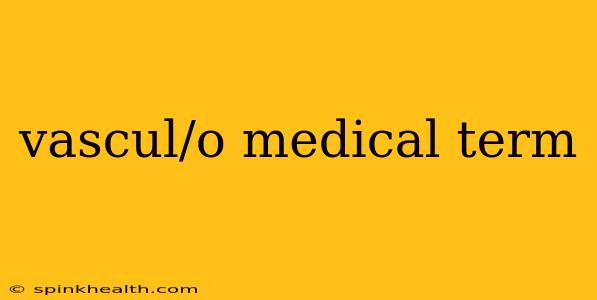Decoding the Medical Term "Vascul/o": A Journey Through the Body's Plumbing System
The term "vascul/o" might sound intimidating, like a secret code whispered in hospital hallways. But fear not! Understanding this medical term is key to understanding a vast network within our bodies: the circulatory system. Think of it as unlocking the secrets of our body's intricate plumbing system. This journey will unravel the meaning of "vascul/o," explore its applications in various medical contexts, and answer some common questions surrounding this vital root.
"Vascul/o" is a combining form derived from the Latin word "vasculum," meaning "small vessel." In medical terminology, it specifically refers to blood vessels. These vessels, the arteries, veins, and capillaries, form a complex network responsible for transporting life-giving blood throughout our bodies. This blood carries oxygen, nutrients, hormones, and other essential substances to every cell, while simultaneously removing waste products. Without a properly functioning vascular system, our bodies simply couldn't survive.
What does vascul/o mean in medical terminology?
This question gets to the heart of the matter. In short, "vascul/o" means blood vessels or relating to blood vessels. It’s a fundamental building block in many medical terms. Understanding its core meaning allows for deciphering more complex terminology that describes various vascular conditions and procedures.
What are some medical terms that use vascul/o?
The beauty of "vascul/o" lies in its versatility. It forms the basis for many medical terms, often combined with other prefixes and suffixes to convey specific meanings. Some examples include:
- Vascular: This is the most straightforward term, simply meaning relating to blood vessels.
- Vasculitis: This refers to inflammation of the blood vessels. This inflammation can occur in various vessel types and locations, leading to a range of symptoms and complications.
- Vascular disease: An umbrella term encompassing various conditions affecting blood vessels, including atherosclerosis (hardening of the arteries), aneurysms (bulges in blood vessel walls), and peripheral artery disease (PAD).
- Vasculopathy: This term indicates a general disease or disorder of the blood vessels.
- Angiogenesis: This describes the formation of new blood vessels, a process crucial for wound healing and tumor growth. While “angio” is a related term also referring to blood vessels, its use often denotes a more specific context within the formation of new vessels.
What are some conditions related to vascul/o?
Numerous medical conditions directly relate to the health and function of our vasculature. These conditions, often serious and requiring medical attention, highlight the importance of maintaining cardiovascular health. Some examples include:
- Deep Vein Thrombosis (DVT): This condition involves the formation of blood clots in the deep veins, often in the legs.
- Pulmonary Embolism (PE): A potentially life-threatening condition where a blood clot travels to the lungs.
- Varicose Veins: These are swollen, twisted veins, often appearing in the legs.
- Atherosclerosis: The buildup of plaque inside the arteries, narrowing them and reducing blood flow. This is a major risk factor for heart attacks and strokes.
How is the term vascul/o used in medical reports?
In medical reports, "vascul/o" or its related terms are frequently employed to precisely describe the location, nature, and extent of vascular problems. For example, a report might mention "vascular compromise" to indicate reduced blood flow to a specific organ or tissue. The use of this terminology ensures clarity and precision in communicating complex medical findings.
Understanding "vascul/o" is more than just memorizing a medical term. It's about appreciating the crucial role of our circulatory system in maintaining overall health and recognizing the importance of addressing any vascular concerns promptly. The next time you encounter this term, remember the intricate network of blood vessels tirelessly working to keep you alive and thriving.

